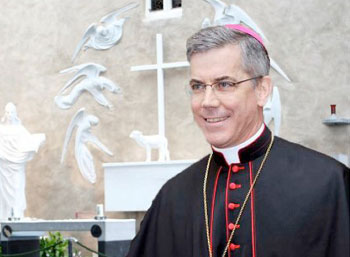Fr Conor McDonough OP
As part of their 2017 celebrations, Dublin’s St Patrick’s Day Festival commissioned a poem, ‘My Ireland’, by Stephen James Smith, available now on YouTube. It’s a kaleidoscope of incongruous impressions of contemporary Ireland and its various mythologies, with some very moving parts and powerfully complemented by the accompanying music and images.
For this listener, however, the piece is somewhat marred by the entirely predictable nature of its perspective on the Church.
Alongside the obligatory references to Archbishop McQuaid, and Sinéad O’Connor ripping up a picture of the Pope, the poet declaims: “My Ireland wonders if it’s a sovereign people still under the shadow of a steeple.”
Presence
The idea that Church activity and institutions are an unwelcome colonising presence – rather than, for example, an exercise of sovereignty and agency on the part of Christian believers – places this poem squarely in line with the attitude of much of the arts establishment.
In Irish poetry, visual art and theatre, positive or even merely nuanced engagement with Christianity is rare. Exceptions exist, of course (John F. Deane’s work, for example, or Dennis O’Driscoll’s ‘Missing God’) but contemporary Irish art typically represents the Church as oppressive, devious and insincere.
One might imagine St Patrick’s Day should be an opportunity for our creative artists to question this hackneyed narrative, yet what we find more often is its unreflective reinforcement – parades and festivals around the country are usually utterly inoffensive, but where there is engagement with Christianity, it is often treated as a source of mild amusement, while pre-Christian Ireland is venerated as somehow more liberated and authentically human. Given this, what should Christian believers do? One approach is simply to resent our exclusion from official Ireland and the arts establishment, and adopt a sullen silence.
But there is another way: faith communities could make a virtue of how they are on the fringes, and cheerfully organise their own events and celebrations.
Approach
This was the approach of the theatrical troupes who inaugurated the Edinburgh Fringe Festival in the 1940s: they weren’t invited to participate in the rather stuffy Edinburgh International Festival, but they came along anyway, and happily performed in unusual venues.
From these humble beginnings the festival on the fringes grew, and now dwarfs the festival from which it was originally excluded.
So how about it? If the Gospel that enflamed St Patrick is not a welcome element at your local St Patrick’s Day celebrations, why not decide next year – as families, parishes and other faith communities – to be a creative minority on the fringe?
Celebrations could centre on a dignified celebration of the Eucharist, of course, but there are all sorts of other possibilities: public readings of the Confession (available on confessio.ie), picnics, pilgrimages, fancy-dress parties, concerts, crafts workshops…
St Patrick wrote his Confession because he could not keep silent about the blessings of the Lord. Yet nearly 1600 years later, many Irish men and women eagerly desire the Church’s silence.
Our response should be to follow Patrick, to refuse to be silent, and to sing, paint, dance and feast in honour of the Lord who blessed Patrick, and blesses us.
* * *
Along with many others, I was disappointed to hear that our Papal Nuncio, Archbishop Charles Brown, will shortly be leaving us for a new appointment in Albania. His cheerful, enthusiastic presence has encouraged many, and his legacy will be manifold, but there’s one aspect of that legacy that struck me as particularly redolent of St Patrick: of the new bishops in whose appointment Archbishop Brown has been involved, three at least have invited new congregations of female religious into their dioceses (the Dominican Sisters of St Cecilia in Limerick, the ‘Hogar de la Madre’ sisters in Elphin and the Apostles of the Sacred Heart in Waterford).
St Patrick’s writings tell us of Irish women enthusiastically taking on religious consecration, and ever since then female religious have been central to the life of our local Church. Thanks in part to Archbishop Brown and his new brothers in the episcopate, the future of this ancient heritage looks brighter now than five years ago.
* * *
What a breath of fresh air it was to hear that Katie Ascough, an intelligent, confident young Catholic, was elected president of the UCD students’ union last week. Anyone who knows the hostility to the Church on Irish university campuses will understand how significant this victory is.
We can all learn something from her campaign: without reneging on any of her principles, she refused to be framed as a culture-war candidate, and instead focussed on issues which concern ordinary students (including the availability of microwaves!). Then she and her team threw themselves into the hard work of knocking on doors and encouraging support. The result: she topped the poll at every polling station on campus.
A model campaign, whose success encourages us all to keep working for a just society and a culture of life.



